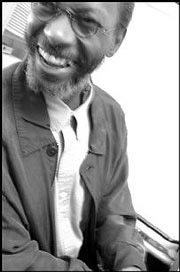JULIAN PRIESTER QUARTET
PONCHO Concert Hall, Cornish College of the Arts
710 E. Roy, 325-6500
$12/$6 students
8 p.m. Sat., Sept. 21
Seattle is home to a handful of jazz elders whose roots go deep in the music’s history. But one man holds a unique place in town: His participation in the music’s many movements is so broad and varied and so consistently at the highest levels that he can rightly be considered the dean of the academy, the city’s strongest connection to everything jazz was and is becoming.
Trombonist Julian Priester, a longtime Cornish instructor, has always made it a point to cover the farthest outposts of the music. He got his start in the early ’50s playing with then-obscure bluesmen like Bo Diddley and Muddy Waters in Chicago. From there, he joined Sun Ra. “I was prepared to respond to all the different styles of jazz,” says Priester, seated at the piano bench in his studio. “And I have stayed in that mind-set all these years.”
Priester played and recorded with Ra’s Arkestra through the ’50s—and even rejoined the band for a time 30 years later, after the space-bound genius made a stop at the Rainbow. In between Arkestra stints, Priester performed and recorded with many other giant figures of jazz: Max (in his political period), Mingus, Herbie (in his electro-Swahili phase), Dolphy, and Duke. Priester played in “society” orchestras and Broadway pits; he was a Jazz Messenger; he backed up singers like Dinah Washington and played early Latin jazz with Cal Tjader; he’s on Trane’s famous Africa/Brass record and early ’90s ECM discs from Dave Holland; and he’s kept a free hand in the avant movement with outward-bound work alongside Sam Rivers and Reggie Workman, from the early ’60s through today.
If there’s a temptation to recount Priester’s career in terms of everyone he’s played with, that’s because he’s largely performed as a modest, if essential, sideman—a band member, a co- creator, but rarely out front. Not since the age of J.J. Johnson and Kai Winding— i.e., the ’50s, when Priester got his start— has anyone been especially interested in promoting the trombone as a starring instrument. (“What’s the definition of an optimist?” goes the current jazz joke. “A trombonist with a cell phone and a pager.”)
Priester’s brand new disc, In Deep End Dance (Conduit)—on a local label started by a Cornish grad—is only his fifth recording as a leader in more than five decades of playing. Here, too, Priester’s diversity of intent is notable. His last CD, Hints on Light and Shadow, with Sam Rivers, was a mostly duo record of sculpted free playing, with Tucker Martine providing electronic backgrounds. Now Priester has returned to an acoustic jazz quartet, playing music that’s open and swinging but with a circuitous, reflective ingenuity in its suitelike structure. Priester’s writing has the long view of jazz history, bringing everything together. And the work of 23-year-old pianist Dawn Clement, a fellow Cornish instructor, is just fantastic—a nonstop surge of unexpected ideas and intrigues.
Despite his soft-spoken, gentle demeanor and the generous spirit that marks a veteran teacher, Priester is very conscious of his place in jazz history and works to maintain a lofty image—something he says he learned from mentors like Max, Miles, and Monk. While he participates in a few local projects, such as Wayne Horvitz’s 4+1 Ensemble, you won’t find him sitting in at Tula’s, and he bristles at any description of himself as a “local” musician. “Once they call you that, they don’t value you anymore,” he says.
Priester has been even scarcer than usual in the last few years: Liver disease, a result of hepatitis C, caused him such severe cramping and fatigue that he had to take a medical leave in the late ’90s. Now, two and a half years after a successful transplant, Priester is feeling strong again and looking to becoming more visible. “I had to do something to let the community know—’Hey, I’m back,'” he says. It’s rare that the spotlight finds him; don’t miss a chance to see him there.









